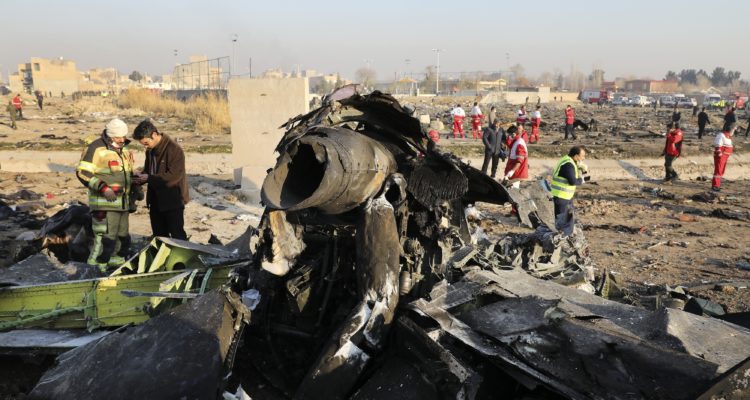Iran had promised harsh revenge after Soleimani’s death, but instead of killing American soldiers, its forces downed a civilian plane in which most passengers were Iranian and none survived.
By Associated Press
Iran’s Revolutionary Guard on Saturday acknowledged that it shot down a Ukrainian jetliner that crashed earlier this week, killing all 176 people aboard.
Tehran finally confessed after days of stonewalling, with the Iranian government repeatedly denying accusations from the U.S. and Iraq and mounting evidence that it was responsible.
The Iranian military shot the plane down early Wednesday, hours after Iran launched a ballistic missile attack on two military bases housing U.S. troops in Iraq in retaliation for the killing of Iranian Gen. Qassem Soleimani in an American airstrike in Baghdad.
No one was hurt in the attack on the U.S. bases.
Iran’s admission raised a host of new questions, such as why Iran did not shut down its international airport or airspace when it was bracing for a U.S. reprisal. It also undermined the credibility of information provided by senior officials, who for three days had adamantly dismissed allegations of a missile strike as Western propaganda.
Iran’s admission could also further inflame anti-regime sentiment, which runs high due to an economy teetering on the brink of collapse and one of the worst human rights records in the world.
Iran had promised harsh revenge after Soleimani’s death, but instead of killing American soldiers, its forces downed a civilian plane in which most passengers were Iranian and none survived.
Iranians had rallied around their leaders after the killing of Soleimani, who armed terror groups across the region in an attempt to wield Iranian influence and undermine sovereign governments.
Hundreds of thousands had attended funeral processions across the country in a show of support for the Islamic Republic just weeks after authorities had quashed massive protests ignited by a hike in gasoline prices during 1,500 people were killed.
That death toll, published by Reuters based on statements from Iranian interior ministry officials, included about 400 women and at least 17 teenagers.
A nation on the brink
Iran has been in the grip of a severe economic crisis since President Donald Trump withdrew the U.S. from the 2015 nuclear deal and imposed crippling sanctions.
The shootdown of the plane and the lack of transparency around it, along with the restrained response to the killing of Soleimani, could reignite anger at the country’s leadership.
President Hassan Rouhani acknowledged Iran’s responsibility but blamed the downing of the plane in part on “threats and bullying” by the United States after the killing of Soleimani. He expressed condolences, calling for a full investigation and the prosecution of those responsible.
Iran’s Foreign Minister Mohammad Javad Zarif also deflected some of the blame, tweeting that “human error at time of crisis caused by US adventurism led to disaster.”
The jetliner, a Boeing 737, went down on the outskirts of Tehran shortly after taking off from Imam Khomeini International Airport.
The U.S. and Canada, citing intelligence, said they believed Iran shot down the aircraft with a surface-to-air missile, a conclusion supported by videos verified by The Associated Press.
The plane, en route to the Ukrainian capital of Kyiv, was carrying 167 passengers and nine crew members from several countries, including 82 Iranians, 57 Canadians — including many Iranians with dual citizenship — and 11 Ukrainians, according to officials.
“This is the right step for the Iranian government to admit responsibility, and it gives people a step toward closure with this admission,” said Payman Parseyan, a prominent Iranian-Canadian in western Canada who lost a number of friends in the crash.
“I think the investigation would have disclosed it whether they admitted it or not. This will give them an opportunity to save face.”
As recently as Friday, Ali Abedzadeh, the head of the national aviation department, had told reporters “with certainty” that a missile had not caused the crash.
Accusations and denials
On Thursday, Cabinet spokesman Ali Rabiei dismissed reports of a missile, saying they “rub salt on a painful wound” for families of the victims.
Iran had also invited Ukraine, Canada, the United States and France to take part in the investigation of the crash, in keeping with international norms. The Boeing 737 was built in the United States and the engine was built by a U.S.-French consortium.
Ukraine’s president said its team of investigators, who are already on the ground in Iran, should continue their work with “full access and cooperation.”
Canadian Prime Minister Justin Trudeau said his country would remain focused on getting justice, closure, accountability and transparency for the families.
Iran’s semi-official Fars news agency reported that the supreme leader on Friday morning had ordered top security officials to review the crash and announce the results.
“If some individuals, in any position, were aware of the issue but made statements contradicting the reality or hid the truth for any reason, they should be named and tried,” said Fars, which is close to the Guard.
Others speculated that the security forces may have concealed information from civilian authorities.
“Concealing the truth from the administration is dreadful,” Mohammad Fazeli, a sociology professor in Tehran, wrote on social media. “If it had not been concealed, the head of civil aviation and the government spokesmen would not have persistently denied it.”
“Concealing the truth for three days is dangerous,” he added.




